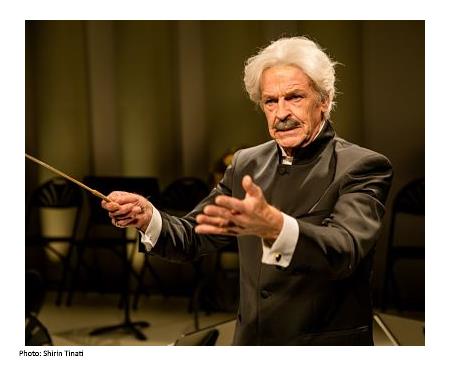


Maestro, the latest work from Ensemble for the Romantic Century, takes place over a specific eight-year period, 1931-1939, one of the darkest in human history. The focus is the great conductor Arturo Toscanini.
Starring John Noble and now playing at the Duke, Maestro is part solo show, part concert. Be forewarned: This isn’t a bio of Toscanini’s life or a celebration of his conducting triumphs. He is already a stellar figure in the classical music world. Instead, via letters — aided by frightening historic footage — this is Toscanini’s rumination on the horrors of pre-WWII as fascism and Nazism engulf Europe.
Maestro travels back and forth in time. We meet the legendary figure in 1938 at 71, conducting Verdi in NBC’s studio 8-H in 1938. Toscanini has just emigrated to New York to conduct the NBC Symphony Orchestra, which David Sarnoff, president of RCA and founder of NBC, created for him.
Maestro is musically masterful, but lacks dramatic intensity. The production favors exposition over a build-to-a-climax story arc. The Toscanini known for his fiery, passionate and sarcastic temperament is not in the house. Instead, Noble ably portrays him as woeful, mournful for a world gone mad.
In fact, Toscanini became one of the most prominent musicians to speak out against both Mussolini and Hitler, taking a public stance against the persecution of Jews and the destruction of his beloved Italy. He was also instrumental in helping Jewish musicians escape to the U.S.
(To put Toscanini in musical context, he played cello in the orchestra for the premiere of Verdi’s Otello and conducted the world premieres of Pagliacci, La Bohème and Turandot. He went on to become chief conductor at La Scala, the Metropolitan Opera and New York Philharmonic.)
During this period, Toscanini refused to attend prestigious festivals in Bayreuth and Salzburg and was beaten by fascist thugs in Milan. He would not conduct the fascist anthem “Giovinezza” at La Scala, raging to a friend: “If I were capable of killing a man, I would kill Mussolini.”
Of special note, his trips to Palestine (modern-day Israel) to conduct an orchestra comprised of Jewish refugees made headlines around the world.
Noble plays Toscanini as a study in rueful anger; his scathing manner is muted, possibly to construct a more positive overall impression. Still, the man’s principled stances are impressive. We learn of his disgust at world events and his yearning for his much-younger mistress, Ada Mainardi, wife of the famous cellist Enrico Mainardi.
For seven years, starting in 1933, they had an intimate liaison and according to Harvey Sachs, a noted Toscanini biographer, he wrote her more than 1,000 letters, telegrams and postcards. Via his missives, his love, both emotional and erotic, is on display.
Despite the narrative misstep, the subject matter is compelling and the musicians — Mari Lee and Henry Wang on violins, Matthew Cohen on viola, Ari Evan on cello, Zhenni Li on piano, and Maximilian Morel on trumpet — are stellar. Selections include Wagner’s “Liebesod,” Tedesco’s “Quintetto for piano and strings” and Verdi’s Aida. There’s also a fantastic rendition of Gershwin’s “Rhapsody in Blue” with a terrific trumpet/coronet solo by Maximilian Morel.
ERC specializes in theatrical concerts that comingle letters, memoirs and diaries with chamber and vocal music to capture a time and personage. That’s a clever twist and Maestro, written by Eve Wolf, is an important story. It works best as a contrast between human savagery and the courage of conviction, the beauty of music and the brutality of bigotry.
And given our current global political situation, the lessons of Maestro bear repeating. —Fern Siegel